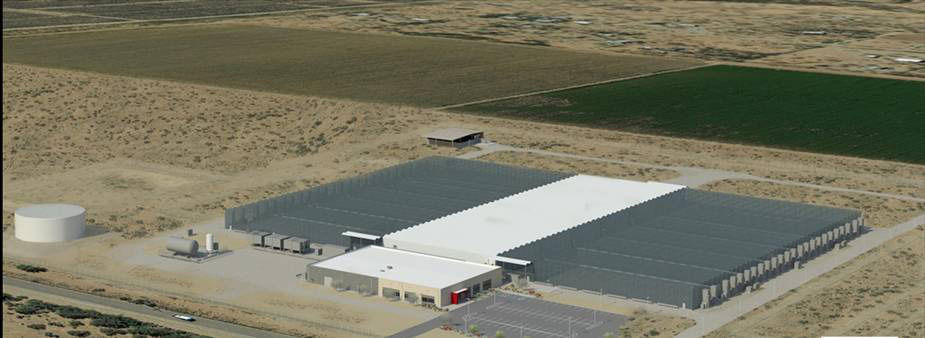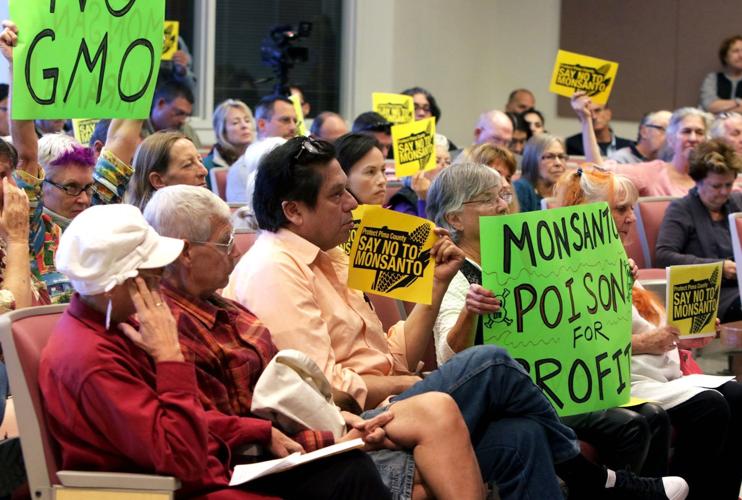After several months of outcry, and a number of lengthy and sometimes tense public meetings, Monsanto has decided to drop a proposal with Pima County that would have substantially reduced the company’s property taxes.
The county Board of Supervisors was set to vote on the deal Tuesday, Feb. 21, but George Gough, the company’s government affairs director, sent a letter Wednesday stating “that after much thought, the Monsanto Co. has decided to withdraw our Foreign Trade Zone Payment In Lieu of Taxes Agreement proposal scheduled for consideration by the Pima County Board of Supervisors.”
Despite the decision, the company still intends to build and operate a greenhouse near Marana on a 155-acre property it purchased last October. It will not proceed with its FTZ application, though it could even without any action from the county. However, company spokeswoman Charla Lord left open the possibility of reconsidering it later, adding: “Anything’s possible.”
Additionally, a company official said it would move forward with other commitments to the area, including a contribution of $500,000 to the Marana Unified School District Foundation, creating a community advisory panel and voluntarily reporting the usage of restricted-use pesticides at the greenhouse, which is slated to grow corn for research in a 7-acre facility at the site.
“We are excited to be a part of Pima County and are committed to being a good neighbor in the community with this greenhouse that combines Arizona’s climate with our sustainable practices to help produce corn seeds that will help farmers around the world,” the company statement read. “Good neighbors listen and communicate with each other, so we value the recent opportunity to do just that.”
Several local Monsanto critics welcomed the development, but said that concerns remain.
“It’s a great win for this community who say this is not the future of the agricultural system we want to see in Arizona,” said Megan Kimble, managing editor of Edible Baja Arizona , a bimonthly Tucson food magazine that editorialized against Monsanto. “We want tax breaks to go to small businesses or organic agriculture or something besides corporate control of our agricultural system.”
However, Kimble pointed out the supervisors were also going to consider on Tuesday a memorandum of understanding with Monsanto that would have allowed for public sharing of information about the company’s activities in the area, an arrangement now off the table with the decision Wednesday.
“They are still going to be here and we will have to be vigilant and ask questions about how they will be accountable to the local community,” she added.
Mike Varney, president and CEO of the Tucson Metro Chamber of Commerce, was one of several members of the business community to speak in defense of the agribusiness giant and deal in recent weeks. He said that while he was “personally disappointed” by the news, he respects the company’s decision.
“I always think it’s unfortunate when a community doesn’t do everything it can to welcome job creators in every way they possibly can,” he said, adding: “This certainly has the potential to generate negative headlines about doing business in Tucson and Pima County.”
He noted that Fortune 200 companies like Monsanto “don’t grow on trees.”
Ted Maxwell, president of the Southern Arizona Leadership Council, said “the most important signal is the fact that Monsanto is still coming.”
Per state law, a foreign-trade-zone designation would drop the property’s assessment ratio from 15 percent to 5 percent. The annual difference in property taxes paid to the county after $96 million in development would be around $370,000 lower with the FTZ rate, documents previously obtained by the Star show.
What the supervisors were going to decide was whether to support Monsanto’s application for foreign-trade-zone status with a letter saying they consented to reduced property-tax payments over 10 years. In exchange, the company would have committed to spending at least $90 million on the development and hiring at least 50 people at an average salary of roughly $44,000. It is the U.S. Department of Commerce that ultimately reviews FTZ applications.
Supervisor Richard Elías, who was one of two supervisors to publicly oppose the deal, said he thinks that public pressure played a part in the company’s decision.
“It’s really the taxpayers and those community folks that got very concerned about Monsanto that made a big difference,” he said.
County Administrator Chuck Huckelberry agreed, adding the highly vocal opposition was met with what he described as the “fairly lukewarm support from the business community.”
He has requested that all items concerning Monsanto on Tuesday’s board agenda be removed.
County officials received dozens of written comments in opposition to the deal, and public comment at supervisor meetings in recent months was sometimes dominated by people speaking out against the deal. Signs opposing the deal were ubiquitous at recent supervisor meetings.
While not dismissing the role of public opposition, Lord said other factors were more important in Monsanto’s decision. Among them, she cited the prospect that by not providing the company with substantial tax breaks, the county could spend more on “workforce development.”
“The county (now) has more money to invest in other things without losing property-tax revenues,” she said.
Huckelberry confirmed that the company’s decision doesn’t necessarily mean that the county will be bringing in any additional revenues, but it could modestly lessen property-tax burdens for other property owners.
“The key element, if you grow the tax base, the existing taxpayers pay less,” he added.
Many critics of the use of economic incentives to attract businesses have suggested that they are often not necessary, and can amount to a giveaway to select companies. With Monsanto’s decision to move ahead with its greenhouse plans without the property-tax savings, Supervisor Steve Christy said “apparently the Monsanto folks did not feel the FTZ designation was necessary to fulfill their portfolio and business plan.”
“It is a valid question, and it is a learning curve issue that we must approach each of these instances differently and singularly and look at them on a standalone basis,” Christy added of issues raised by incentive critics.
Huckelberry agreed that in the case of Monsanto the benefits of operating in Pima County outweighed the loss of the property-tax incentives. However, he argued that there are other clear-cut instances in which incentives offered by the county others “made the difference.” He cited Caterpillar and Raytheon’s recent decision to expand operations as examples of the successful use of incentives.
He also said that Monsanto’s decision would have “no effect on any consideration the county might give a future employer for a foreign-trade-zone property-tax abatement.”
Those are considered on a “case-by-case basis,” and potential employers that could bring a number of high-wage jobs or substantial tax base improvements
“Anything similar is going to get a consideration as to whether we offer that as an economic incentive,” he added.






